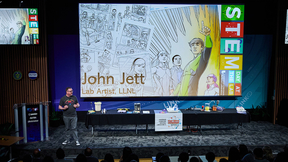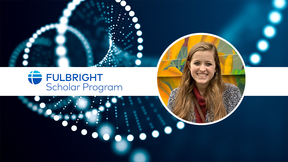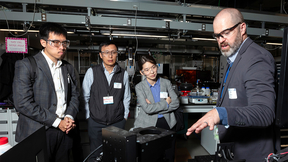LLNL’s Raspberry Simpson named Kavli Fellow
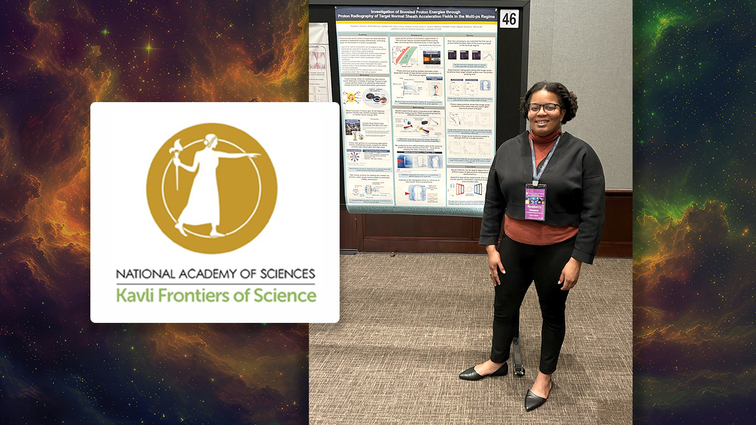 (Download Image)
(Download Image)
LLNL’s Raspberry Simpson, selected as a National Academy of Sciences (NAS) Kavli Fellow, presented a poster on her postdoctoral fellowship at the academy’s annual Kavli Frontiers of Science symposium on March 7-9. Credit: Raspberry Simpson.
Raspberry Simpson, a Lawrence Fellow in Lawrence Livermore National Laboratory’s (LLNL) National Ignition Facility and Photon Science (NIF&PS) Directorate, has been named a National Academy of Sciences (NAS) Kavli Fellow.
As a new Kavli fellow, Simpson participated recently in the annual NAS Kavli Frontiers of Science symposium in Irvine, California. NAS invited outstanding young scientists to discuss advances and opportunities in a wide variety of disciplines, including astrophysics, space science, space technology and xenobots — synthetic lifeforms made from components of living cells designed to perform robotic functions.
“It was definitely an honor to be invited to attend this meeting and to be able to meet other early-career scientists in other fields and learn about the NAS, which has the mission to inform the government on a wide array of scientific topics,” Simpson said. “I was able to make important connections with scientists outside of my field, such as individuals from Lawrence Berkeley National Laboratory that work in astrophysics and people from NASA Goddard.”
The Goddard Space Flight Center is the National Aeronautics and Space Administration’s premiere space flight complex in Greenbelt, Maryland.
“I’m happy to be included in the NAS and Kavli communities and hope to be able to contribute in the future on their reports on high-energy-density (HED) science, high-brightness sources or fusion energy,” she said.
Simpson presented a poster on her postdoctoral fellowship titled “Investigation of Boosted Proton Energies in the Multi-ps Regime for Applications to Proton Fast Ignition.”
“It was a nice experience to be able to practice my own scientific communication and explain my work to individuals who are not necessarily in my field,” she said.
Simpson joined LLNL in 2022. She works on developing new experimental and machine-learning tools to optimize laser-driven secondary particle sources. Her work aims to address the need for next-generation diagnostics, machine-learning methods and analysis tools to be able to perform laser experiments at faster rates.
Simpson received her Ph.D. in nuclear engineering with a focus on plasma physics from the Massachusetts Institute of Technology. She completed most of her Ph.D. research at LLNL under the direction of physicist Tammy Ma, focusing on the investigation of laser-driven particle acceleration for the development of tunable ion sources for applications in HED science.
Before her graduate studies, Simpson worked in the physics division of Los Alamos National Laboratory in New Mexico, developing neutron-imaging diagnostics for inertial confinement fusion experiments and electron radiography for material science studies.
Simpson received her undergraduate degree in applied physics from Columbia University. She is a recipient of the National Science Foundation Graduate Research Fellowship and the National Nuclear Security Administration Laboratory Residency Graduate Fellowship.
Simpson is the Lab’s 10th Kavli fellow since the program began in 1989. Other LLNL Kavli fellows are Félicie Albert, Jonathan Belof, Ken Caldeira, Henry Chapman, Alison Christopherson, Tom Guilderson, Stefan Hau-Riege, Michael MacCracken and Arthur Pak.
The symposium is sponsored by the Kavli Foundation, which was founded by the late Fred Kavli to advance science and promote understanding of scientific research.
—Jon Kawamoto
Contact
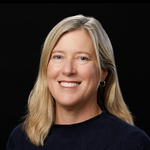 Patricia Koning
Patricia Koning
[email protected]
(925) 423-4332
Related Links
National Academy of SciencesKavli Frontiers of Science
Tammy Ma
Tags
High-Energy-Density ScienceCareers
National Ignition Facility and Photon Science
Academic Engagement
High Energy Density Science
Featured Articles
